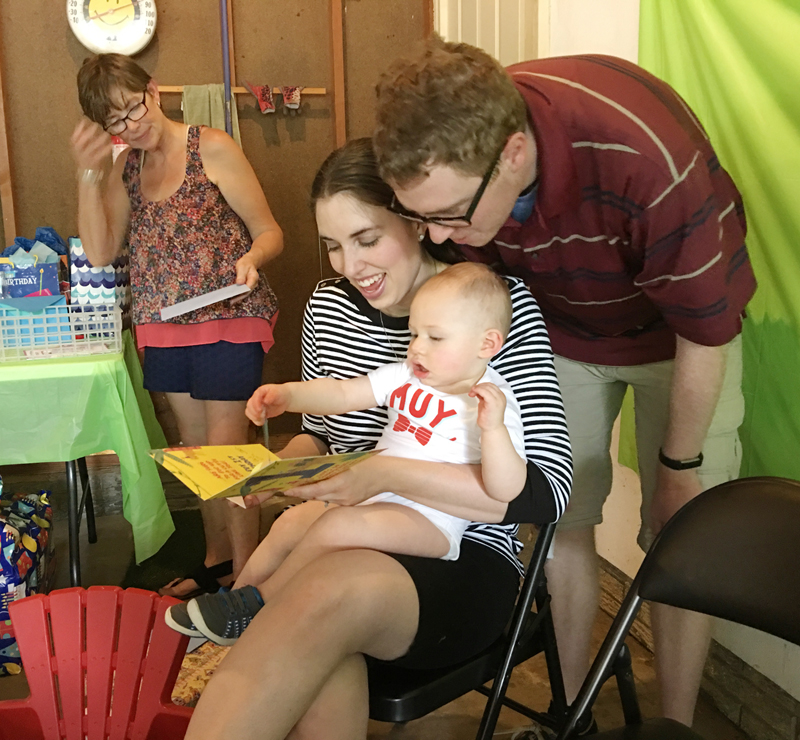By Lindsay Steele
At Catholics in Action later this month, youths and adult leaders will have the opportunity to learn about mental health from a variety of perspectives. So, I thought this might be a good opportunity to share my own mental health journey.

Lindsay and Chris Steele’s son, Bradley, celebrated his first birthday on May 28. Lindsay’s mother, Renada Schoon, looks on. Before Lindsay sought treatment for anxiety, milestones such as marriage, raising children and working a steady job seemed unreachable.
I have Generalized Anxiety Disorder. In other words, I live in a constant state of unease. I tend to expect disaster, whether at work, at home or in social situations. It’s under control now, but for 15 years of my life the heavy burden of anxiety made me feel like I was surviving rather than thriving.
I first suspected something was wrong when I entered kindergarten. I realized I wasn’t like other kids or, rather, that’s when people began to point out my behavior as abnormal. “She doesn’t talk to her classmates,” teachers would tell my parents. “You’re weird,” my classmates would tell me. I felt lost at recess and at lunch, where I agonized over decisions like where to sit, who to play with and what to say. I was envious of the other kids who seemed to be able to do those things with little effort. I began to feel lonely and depressed.
My parents were concerned, but teachers told my parents I would grow out of it. They figured I was just shy. My parents tried to model the social behavior they hoped to see in me. They created situations for me to interact with peers outside of school, but I felt paralyzed. No matter what they did, I was still terrified of social situations. Meanwhile, my little sister thrived socially and was very well liked among her peers. Despite being talented in other areas — like academics and music — I saw myself as a failure because of my social difficulties.
By the time I got to junior high, daily life felt unbearable. The tipping point for me was an eighth-grade dance, where I stood against the gym wall watching everyone else having a good time. Those two hours seemed to last a lifetime. Not long after that, I told my mom I wanted to kill myself. At that point, my parents realized that it wasn’t just a phase. I needed professional help.
They made an appointment for me to see a local psychiatrist. I had to wait one month until he could see me, and I counted down the days out of sheer excitement. Maybe, finally, someone would be able to help me feel better.
The psychiatrist asked me a long list of questions before making my diagnosis. He told me it wasn’t my fault, and it wasn’t my parents’ fault. I had a chemical imbalance in my brain that could be alleviated by daily medication and professional counseling. I was hopeful and relieved. I was surprised that the psychiatrist didn’t diagnose me with Social Anxiety Disorder, but because I expressed feeling anxiety in other aspects of my life, he felt a general diagnosis was best. The medicine helped take the edge off my anxiety in a way that was very subtle. I didn’t feel numb or zoned out. In counseling, my social worker, Scott, mainly helped me to rethink the way I approached social situations. He gave me “exercises” each week to help me learn to communicate with my peers.
Looking back, it feels as if my life started on that day I saw the psychiatrist. It took a lot of hard work on my part, and I still struggle sometimes, but treatment allowed me to start making friends, dating and working. To finally be able to express myself — and not agonize over every social interaction — was liberating.
I sometimes think about what could have been had I received treatment sooner. I feel like I lost out on most of my childhood and I wish I could get that time back. My mom wishes she had known how to spot the symptoms of mental illness sooner; so did my late father. But mental illness wasn’t something people talked about when I was a kid. My parents did the best they could with the resources they had. I’m grateful to them for seeking out and supporting my treatment once they realized it was necessary. Not everyone is so lucky.
Today, mental illness still isn’t talked about as often as it should be. I tell people to think about it like diabetes; sometimes it can be controlled through changes in behavior. Sometimes it is chemical. Sometimes it needs a multi-pronged approach. People shouldn’t be fearful of being ostracized for seeking treatment.
I know I’m fortunate to have gotten a correct diagnosis and treatment plan. With a shortage of psychiatrists and mental health care providers, especially in Iowa, it can be a challenge. If you or someone you know was treated in an emergency room or general clinic and feel that the medication or treatment wasn’t right, don’t give up. It is worth it to see someone who has been properly trained in mental health treatment. If more people advocate for mental health services at the state level, and if more people choose to enter the mental health field, access to appropriate mental health care will improve.
It is my hope that CIA participants will be transformed as they learn more about mental health. Maybe some of the youths will be inspired to enter the mental health field as adults, or become advocates in their own communities.
(Editor’s note: Lindsay Steele is a reporter for The Catholic Messenger. Contact her at steele@davenportdiocese.org or by phone at (563) 888-4248.)












Thank you for sharing your experiences and path to treatment and learning to live wit GAD. Mental Illness can be so scary and isolating. It is still a largely taboo subject in our country. I hope people who’ve had symptoms and experiences similar to those you describe will be reassured there is help.
Your choice to be vulnerable and open can help our society grow and become more compassionate.
Thank you again!!